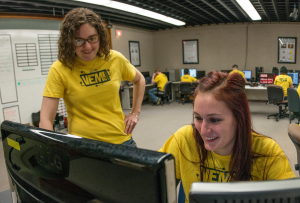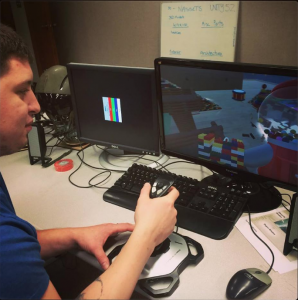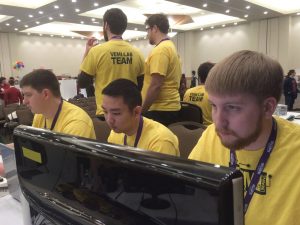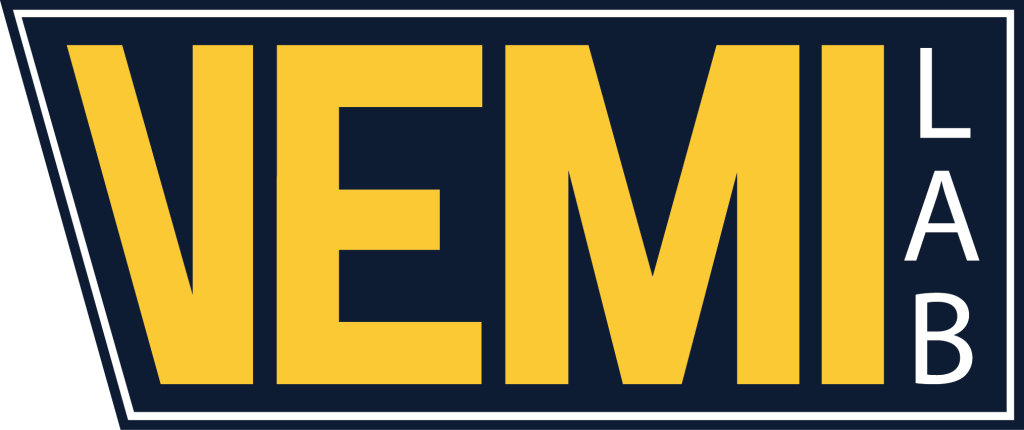ABOUT US
VEMI's Philosophy & Mission
VEMI’s mission is to conduct pioneering research leading to developments of innovative technologies that 1) improve navigation, 2) make information access easier and more intuitive, and 3) have immediate societal impact by providing life-changing solutions for blind/visually impaired people, for older adults, or for anybody in need of eyes-free environmental access.
VEMI adopts the research philosophy that good science should strive to be both theoretically motivated and functionally relevant. As such, VEMI’s studies combine basic questions about how humans learn, represent, and act in their environment with applied efforts toward the development of navigational technologies to support these endeavors.

What Makes VEMI Different
Dr. Giudice’s background in experimental psychology, cognitive neuroscience, and human-computer interaction, combined with Dr. Corey’s background in user experience design, interactive media, and marketing, equips VEMI to truly understand human-centric technology design. VEMI Lab members come from a diverse set of academic backgrounds ranging from psychology and anthropology to computer science and mechanical engineering.
VEMI's Research
Spatial behavior is one of the most fundamental aspects of our existence, yet most people have never considered what information they use to navigate their environment or how they use this information for effective decision-making. Think about the last time you walked around the mall, toured a new city, or needed to find your gate at the airport. Assuming clear signage, these spatial activities were likely performed with little thought or effort, but how was this accomplished? What information was most useful and how did you actually use these cues to support your behavior? The answers to such questions are surprisingly difficult to articulate. These tasks are not a conscious process for most people, they are simply the product of an effective visually-guided perceptual-motor coupling. However, when reliance on visual information is not available, the automaticity of your behavior likely changes dramatically. For instance, imagine that you must perform the same tasks wearing a blindfold. Most people would find the prospect of navigating complex environments like malls, cities, or airports without vision incredibly daunting, if not completely incomprehensible. How would you avoid obstacles, know what is around you, figure out where to go, recognize landmarks, read signs, stay oriented, and build up a mental representation of space as you walked around? Research at VEMI studies such issues by comparing similarities and differences for spatial information processing between visual and non-visual input modalities for learning, representing, and behaving in the world.

VEMI's Technology
The VEMI Lab is located in Carnegie Hall on the University of Maine campus, and houses the University’s first, and Maine’s only, emerging technology facility. VEMI combines a fully immersive, multimodal virtual reality (VR) installation with augmented reality (AR) technologies in an integrated research and development environment. There are many advantages to using these technologies as research tools, as a development and usability platform, or as an information framework for information visualization.
VEMI's Collaborations
VEMI frequently collaborates with other researchers and commercial partners on joint research projects to provide cutting-edge nonvisual multimodal technology to blind, older, or eyes-free users, or to create one-of-a-kind interactive multimodal visualizations. The VEMI Lab’s expertise allows us to bridge the gap between researchers or companies developing high-tech products and end users.
VEMI's Public Outreach
VEMI often participates in outreach and interaction with the public, providing interactive demonstrations and encouraging engagement with new and exciting technology and its applications. We provide tours of VEMI’s cutting-edge facility to interested groups and organizations, as well as contribute to large-scale public events such as the Maine Science Festival. If you are interested in having VEMI participate in an external outreach event, please see our Public Education Policy.


